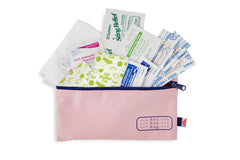“Clean beauty” seems to be everywhere we look these days. The space has grown exponentially in recent years with many new players in the space, some of whom seem to be riding the coattails of earlier trailblazers. As a consumer it can be hard to break through the noise and all of the marketing to understand what clean beauty truly is and why it matters.
One new brand in the space, who is doing things differently–pushing the definition of CLEAN and their own standards for excellence–is Doré. Their products, certifications–and amazingly their price point, speak for themselves. But we were lucky enough to sit down with Doré CEO, Emily Yeston, to learn more about what Clean can really mean and how we can get there across our beauty routines.
Let’s start with a couple of core definitions:
How do you define "clean beauty" and what exactly is "French pharmacy skincare?"
Emily: “Clean” can mean 100 different things depending on who you're talking to, but for us, clean really meant safe. And so all of our products are EWG (Environmental Working Group) verified for consumer health and safety. That means that they can have synthetic ingredients in them. Not necessarily everything that's natural is good for you; synthetics can be great. But there are synthetics that have been tested for decades, and we know that they don't cause endocrine disruption or create sensitivity in the skin or any of those things. So, for us, clean truly is about safety.
French pharmacy skincare is skincare that's celebrated for being clinically efficacious. That means that products are actually tested by dermatologists and scientists to have real results behind them. We use technology to tell us, for example, how long does the skin stay hydrated after you apply a product. We're actually using data to reinforce what we're saying around a message. French pharmacy skincare is typically formulated for sensitive skin and most of it is good for sensitive skin. It's also typically affordable. To us it was essential to have formulas that are that high performing but at an accessible price point.The French have done a great thing of making you feel like beauty doesn't need to be expensive to be good.
So what do you recommend we look for to sift through all the noise and find products that are truly “Clean” in the most pure, trustworthy sense?
Emily: I think first you have to decide what clean means to you, and that means what is most important for you. Do you want natural products? Do you want products that are safe? Are you really thinking more about sustainability? Once you define what you’re looking for, there are different resources depending on what that is. EWG’s Skin Deep Database is really helpful for finding safe products. And retailers like Credo Beauty have done an incredible job of creating a huge assortment of clean brands and products, and they are very clear in defining their clean standard.
Doré recently expanded your line to a new 4th product: Le Micellaire, a micellar cleansing water that I’m as obsessed with as the 3 original products (le cleanser, le baume and la crème). How do we get everything we need from these products?
E: The myth of skincare that the marketing world has sold to most customers is that more is more, when really less is more. We found that our skin is healthiest when we pare things down and get back to basics. Skincare should really be a three step process: cleansing, treating, and then moisturizing. So we've started with Le Cleanser which is incredibly gentle and hydrating. It's so important not to use a cleanser that's drying out your skin, which is that tight feeling that people get after they wash their face with something sudsy. That's usually an ingredient that's just creating a foaminess and is not actually cleaning your skin. In addition to Le Cleanser, we also launched La Micellaire which is a rinse-free cleansing option - a product like this is great for super sensitive skin or if you have hard water that’s super mineral heavy and can dry out your skin. I love to use micellar water in the morning, and our cleanser at night.
After cleansing, treatment would be second. This is something that we're working on formulating now, and that's where if you have an issue that you're dealing with--hyperpigmentation or acne for example--you would use a serum step. We have them coming! And then the moisturizing step is the hydrating step that's meant to lock it all. Sometimes what people don't understand about moisturizer is that it is hydrating your skin, but it's also creating a protective layer to help moisture stay in your skin, even more so than increasing the moisture content in your skin.
Most of the time good skin is equated with hydration. A lot of the issues that you see can be solved through making sure that your skin is hydrated; fine lines and wrinkles appear smaller when you have better hydration levels in your skin, things like that. Our balm is a specialty product that's meant to create that extra boost of hydration, and not necessarily just for your face, but other parts of the body that might be suffering from incredibly dry skin. Chapped lips, cuticles, dry elbows; it's helpful for eczema. It has castor oil in it, so it actually can be helpful for things like brow growth and lash growth as well.
That's really like the core of the line. We wanted to start simple so that we would encourage our customers to take a step back, reassess how many steps were in their routine and start to pare things back. Good skin also comes from consistency, and it's hard to stay consistent when you have a ten step routine. So bringing it back to basics and doing it every day is really what helps you achieve great skin.
I want to get into the nitty gritty for a minute; the process of formulating each product in the line seems crazy daunting. Where do you even start? Are you pretty much a chemist now?
E: I definitely know a lot more about ingredients now than I used to, but really it's about coming to a lab with a brief of what the results are that you're looking to achieve from the product. So being very results-oriented, thinking a lot about texture and what you're looking for in texture from a product. Then, if there are specific active ingredients that you know that you want in a formula, you can talk about those with your chemist.
For us, it’s more important to have great formulas than something that told a marketing story. The formulas should speak for themselves. So we came with the results that we wanted and the textures that we liked, and from there it's a process of trial and error. For example, there's what they call too much playtime, which is like rubbing, how long it takes the product to absorb into your skin. So if our formula has too much playtime, they'll work on tweaking the texture to reduce that.
Some formulas, you get right on the first try. Some formulas, it takes 40 or 50 submissions before you get to your perfect formula. It’s many, many small tweaks as you go.
Going back to clean beauty and safety, why was it so important to you and Garance to be verified by the Environmental Working Group?
E: Because we're not scientists and don't know the impact of ingredients on the molecular level, we wanted to partner with an organization that could hold us accountable to high standards of clean beauty. We didn't want to "green wash" our brand and tell customers Doré is clean beauty without clearly defining what that means and holding ourselves to a specific standard.
EWG does not ban all synthetic ingredients, rather they look at the value and impact of those ingredients on our bodies and the environment. There are synthetic ingredients on the market that have been around forever and actually bring a lot of stability to formulas--making them work better and stay effective longer than purely natural ingredients.
EWG is a partner that holds their verified brands to the highest standards of safety. They're constantly doing research and updating their list of restricted ingredients, which means that to stay EWG verified, we have to continue to comply with that list, which they update every 18 months. If we have to reformulate in 18 months because an ingredient that we thought was okay is now found to not be okay, we're committed to doing that to maintain this important verification.
I have to ask, what's next for Doré? Anything else for us to look forward to?
E: We're starting to work with new retail partners. Making Doré accessible to as many people as possible, at as many locations as possible around the world is a priority to us. Working to build retail relationships both here in the US and abroad is a really big focus for 2023.
And beyond Doré, what are your top Clean Beauty recommendations?
Make Up:
Westman Atelier Complexion Drops | Ilia Mascara | Jones Road Lip and Cheek Stick
Body:
Goop Dry Brush | Nécessaire Body Bar | Corpus Deodorant | Davids Toothpaste | Wonder Valley Body Oil
Hair:
Ceremonia Shampoo | Ceremonia Conditioner | Crown Affair Leave In Conditioner
And lastly, I have to say, perhaps even more exciting than the beautiful packaging and the simple approach to clean beauty, is the Doré price point. How is it possible? Is everybody else just, like, charging way too much? How is Doré so affordable by comparison?
E: The majority of the profit margin in beauty goes towards marketing spend and operations, not the cost of making the product. We fought really hard to be able to retail our products for as little as possible, because that accessibility was incredibly important to us. Every consumer should have great clean options for skincare, even in “mass” retail. Just because a cream is $300 does not mean it costs more to make or that the ingredients are more expensive. It means that the brand has a 95% margin on their products. This was something we had become very well-aware of as we worked with larger institutional beauty brands over the years. And that wasn't a cost that we felt should be passed through to the consumer.
Hear Garance’s thoughts on simple beauty here:





Leave a comment